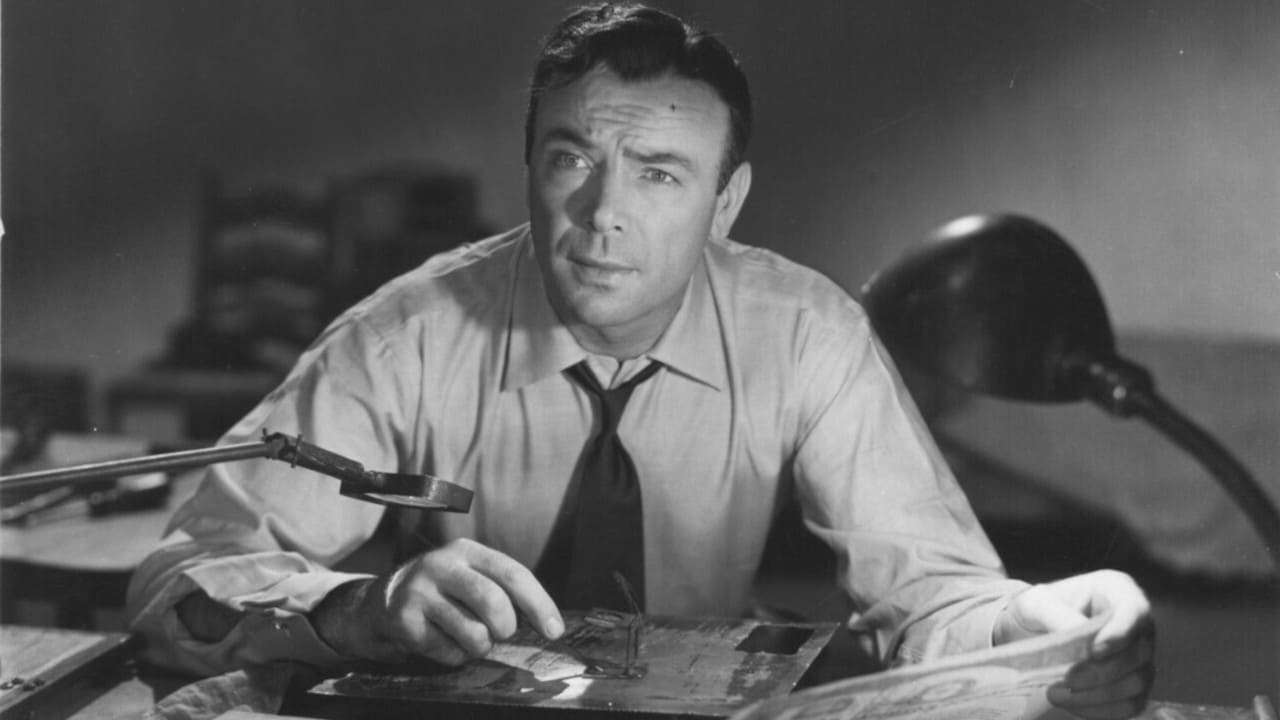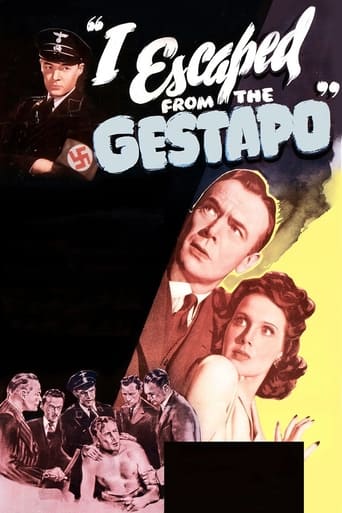Skunkyrate
Gripping story with well-crafted characters
Supelice
Dreadfully Boring
SeeQuant
Blending excellent reporting and strong storytelling, this is a disturbing film truly stranger than fiction
Motompa
Go in cold, and you're likely to emerge with your blood boiling. This has to be seen to be believed.
kevin olzak
1943's "I Escaped from the Gestapo" was also issued under the more accurate title "No Escape," as the audience is left to feel just as trapped as Torgut Lane (Dean Jagger), confined in a small, windowless room in the back of a Los Angeles arcade run by Nazi agent Martin (John Carradine). This being a typical Poverty Row production from Monogram, we get a montage of stock footage depicting Lane's well-orchestrated prison break, so that he can use his counterfeiting skills forging bonds and passports on behalf of the Third Reich. Jagger never seems to be too worried about his predicament, and Carradine pretty much gives the same kind of detached performance he usually gave at Monogram ("Revenge of the Zombies," "Return of the Ape Man," "Voodoo Man," "Alaska," "The Face of Marble"). Carradine even lets loose with a mighty yawn in front of Jagger, and neither actor flinched (much). Among the stellar supporting cast we have, in one of her last roles, Mary Brian, best remembered as W. C. Fields' daughter in "Running Wild," "Two Flaming Youths," and "Man on the Flying Trapeze"; Sidney Blackmer and Ian Keith, very adept at playing villains (Carradine even named one of his sons after Keith); Spanky McFarland, at 14 not much taller than one would expect; and one single shot of Frances Farmer, originally cast in the Mary Brian role, who only returned to Hollywood in 1958. John Carradine and Dean Jagger saw a great deal of each other over a span of 32 years: "Brigham Young" (from 1940), "Western Union," "Alaska," "C-Man," "The Proud Rebel," and a memorable confrontation between Carradine's blind preacher and Jagger's bigoted stonemason, Caine's grandfather, in KUNG FU's "Dark Angel" (from 1972).
dinky-4
Its title implies a "behind-enemy-lines" thriller set inside Nazi Germany, but this 1943 production is set in the good ol' U.S.A. - mostly in Southern California. It tells about a skilled counterfeiter (Dean Jagger) who finds himself suddenly sprung from prison by a well-organized group of law-breakers seeking to make use of his talents. These law-breakers, headed by John Carradine, set him up at a print-shop located next to an amusement park arcade. At first Jagger, who's held as a virtual prisoner, assumes his "benefactors" are simply criminals of the standard variety seeking to make illegal money, but gradually he discovers they are actually agents of the Third Reich endeavoring to undermine America's war effort. Jagger now vows to no longer work for them but they threaten to kill his mother unless he co-operates so Jagger then tries to find a way to alert the F.B.I. while still doing his captors' bidding.As well as offering intriguing glimpses of American life and attitudes during World War II, this low-budget production also provides characters and a story which hold one's interest, though its story-line wavers a bit in the second half. The obligatory romance between Jagger and a young woman working at the arcade is temporarily derailed by a subplot in which Jagger tries to convert a young Nazi to the American side. In the process, the Nazi falls for the young woman and it takes some heavy-handed and not quite convincing plotting to resolve this romantic triangle.The movie's highlight scene occurs when the Nazis decide to use force on the reluctant Jagger. He's shown, stripped to the waist, bound to his printing press, while Sidney Blackmer - yes, Sidney Blackmer - beats him 21 times across the back with a nasty-looking length of rubber hose. This being 1940s Hollywood, the hose is never shown actually striking Jagger's back and Jagger's reaction shots - he's only photographed from the shoulders up - merely show him to be mildly distressed, as if he ate something that didn't quite agree with him. Meanwhile John Carradine, who sits nearby reading a book, says: "Brutality disturbs me. Turn on the radio." Perhaps soothing music will mask the sound of that hose smashing into Jagger's back. Alas, Carradine's notion of brutality is quite limited. Any cop or prison guard would know that a rubber hose is more effectively used not on a man's back but on another, more sensitive part of his anatomy. And as for Jagger, that beating seems to have absolutely no ill effect on him, not even a back-ache.
jmk56
A movie that would be confined to the dustbin of low-budget history if it were not infamous as the film Frances Farmer was making when she had her breakdown and was arrested in Hollywood, soon to be institutionalized for most of the rest of the decade. The notoriously cheap King Brothers of Monogram Studios must have wanted to use every scrap of film they had shot, for they use a very brief shot of Farmer, evidently taken on the only day of filming she completed on this project, in a montage sequence. The sight of Farmer, staring at the camera with a puzzled and perhaps frightened look on her face as she pulls a shawl over her head, is unforgettable and about the only thing worth remembering about this film.

